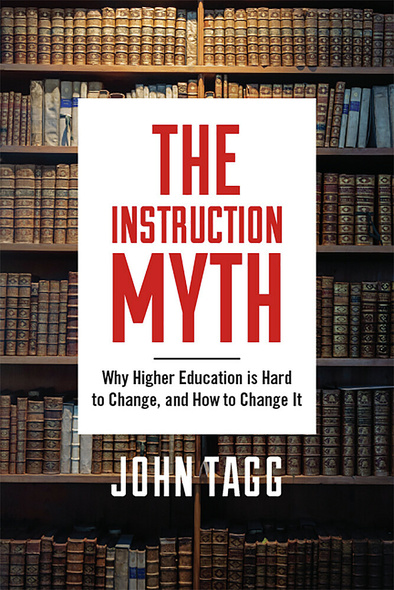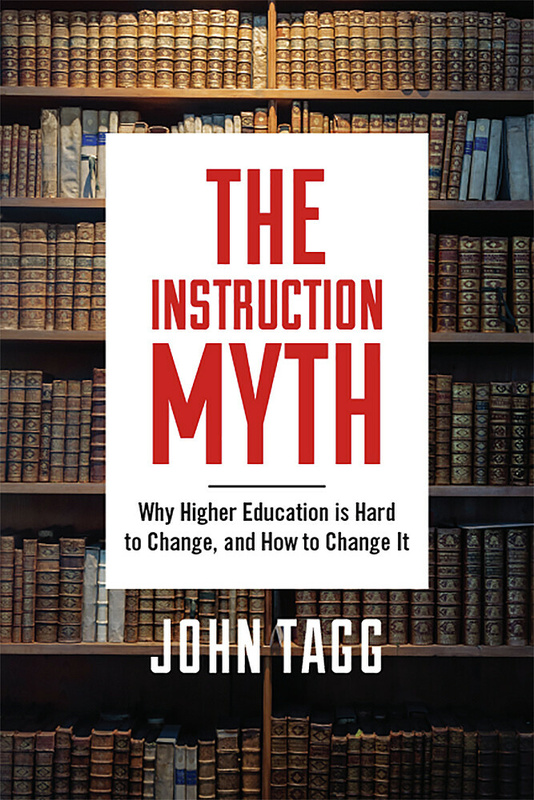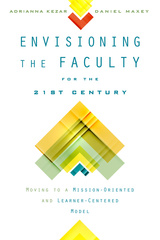The Instruction Myth
Why Higher Education is Hard to Change, and How to Change It
By John Tagg
Rutgers University Press
Higher education is broken, and we haven’t been able to fix it. Even in the face of great and growing dysfunction, it seems resistant to fundamental change. At this point, can anything be done to save it?
The Instruction Myth argues that yes, higher education can be reformed and reinvigorated, but it will not be an easy process. In fact, it will require universities to abandon their central operating principle, the belief that education revolves around instruction, easily measurable in course syllabi, credits, and enrollments. Acclaimed education scholar John Tagg presents a powerful case that instruction alone is worthless and that universities should instead be centered upon student learning, which is far harder to quantify and standardize. Yet, as he shows, decades of research have indicated how to best promote student learning, but few universities have systematically implemented these suggestions.
This book demonstrates why higher education must undergo radical change if it hopes to survive. More importantly, it offers specific policy suggestions for how universities can break their harmful dependence on the instruction myth. In this extensively researched book, Tagg offers a compelling diagnosis of what’s ailing American higher education and a prescription for how it might still heal itself.
The Instruction Myth argues that yes, higher education can be reformed and reinvigorated, but it will not be an easy process. In fact, it will require universities to abandon their central operating principle, the belief that education revolves around instruction, easily measurable in course syllabi, credits, and enrollments. Acclaimed education scholar John Tagg presents a powerful case that instruction alone is worthless and that universities should instead be centered upon student learning, which is far harder to quantify and standardize. Yet, as he shows, decades of research have indicated how to best promote student learning, but few universities have systematically implemented these suggestions.
This book demonstrates why higher education must undergo radical change if it hopes to survive. More importantly, it offers specific policy suggestions for how universities can break their harmful dependence on the instruction myth. In this extensively researched book, Tagg offers a compelling diagnosis of what’s ailing American higher education and a prescription for how it might still heal itself.
Any administrator who wants to distinguish his or her institution from others, can and should do so by creating a truly learning-centered educational program. In this book, Tagg lays out the challenges that will have to be dealt with in such an endeavor, and describes several tools for achieving the changes needed.'
The Instruction Myth is among the most well thought out and well-researched studies on the issues related to students’ learning in higher education and the continuing struggles higher ed has to move from being teacher and course centered to learner centered. John Tagg details the problems and offers solutions that every college should be interested in adopting. Everyone who works in higher education should read this book.'
As a higher education diagnostician, John Tagg writes with wry acumen to prescribe the needed solutions, including some bitter pills that are clearly necessary given the logic presented in this important book.
John Tagg boldly declares the emperor has no clothes. He lays out the myths and hidden assumptions that impede reform in higher education and offers key points of leverage change.
Many readers will be familiar with—and fans of—John Tagg’s work, as I am, and this new volume draws on and extends that work in fresh and generative ways. It’s full of big ideas, captivating examples, and a powerful vision of what it takes to create change in the complex ecology of higher education.
Teaching quality in US higher education is a myth,' by John Tagg
'The Chronicle of Higher Education 'Selected New Books in Higher Education' roundup' compiled by Ruth Hammond
https://www.chronicle.com/article/Selected-New-Books-on-Higher/246484?key=M4Uz02RD-3jerweavC_IPHDsdSj4sLkLIhfQSzDWsVxUs6OvR_d7rFjljkbHmAI7Wi0zZzk5OC0tb1FnZjRGYmJYOXlHd05ZNDJxLVJXUGNlNWR2MmxSMVVaVQ
The pandemic 'break' we have just experienced provides the opportunity for institutions to rethink evaluation. [The Instruction Myth] provide[s] [a] powerful lenses for that reflection.
JOHN TAGG is a professor emeritus of English at Palomar College in San Marcos, California. He is the author of The Learning Paradigm College.
Contents
Introduction
Part I: Where Are We and How Did We Get Here?
1 The Chronic Crisis
2 How Did It Get This Way?
Part II: Why Is Change So Hard?
3 The Status Quo Bias
4 How the Status Quo Bias Defends Itself in Organizations
5 The Design of Colleges and the Myths of Quality
6 Framing the Faculty Role: Graduate School, Departments, and the Price of Change
7 The Myth of Unity and the Paradox of Effort
8 Faculty Expertise and the Myth of Teacher Professionalism
9 Trial Run: Changing the College, the Case of the Degree Qualifications Profile
Part III: Learning to Change, Changing to Learn
10 Seeds of Change
11 How Do People Learn to Change?
12 Diffusing Innovation by Making Peer Groups
13 Promoting Innovation Through Scholarly Teaching
14 Information Flow and Feedback—The Teaching Inventory and Portfolio
15 Information Flow and Feedback: The Outcomes Transcript and Portfolio
16 Changing the Faculty Endowment
17 Creating a Market for Education
18 Levers for Change: A New Accountability
Acknowledgments
Bibliography
Index
Introduction
Part I: Where Are We and How Did We Get Here?
1 The Chronic Crisis
2 How Did It Get This Way?
Part II: Why Is Change So Hard?
3 The Status Quo Bias
4 How the Status Quo Bias Defends Itself in Organizations
5 The Design of Colleges and the Myths of Quality
6 Framing the Faculty Role: Graduate School, Departments, and the Price of Change
7 The Myth of Unity and the Paradox of Effort
8 Faculty Expertise and the Myth of Teacher Professionalism
9 Trial Run: Changing the College, the Case of the Degree Qualifications Profile
Part III: Learning to Change, Changing to Learn
10 Seeds of Change
11 How Do People Learn to Change?
12 Diffusing Innovation by Making Peer Groups
13 Promoting Innovation Through Scholarly Teaching
14 Information Flow and Feedback—The Teaching Inventory and Portfolio
15 Information Flow and Feedback: The Outcomes Transcript and Portfolio
16 Changing the Faculty Endowment
17 Creating a Market for Education
18 Levers for Change: A New Accountability
Acknowledgments
Bibliography
Index







